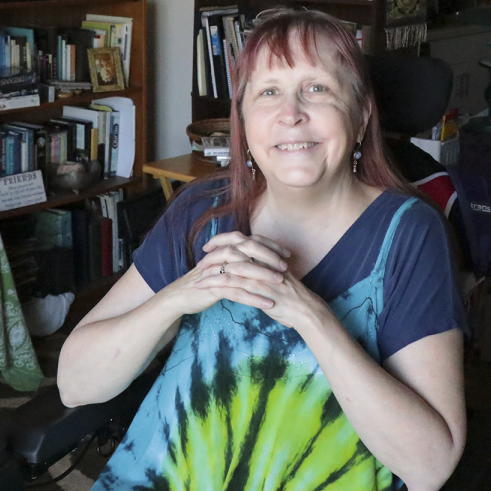A Rolling Perspective: Live Streaming NOW!

technology comes from sellers: they need consumers to purchase before
the higher brain kicks in and nixes the idea."
I slept in later than I’d planned today, waking just in time to catch a live webinar stream. Or so I thought. I hit the link to join in, but all I got was a blank avatar and a voiceover: “Dr D’s experiencing technical difficulties with his laptop. We hope to begin shortly.” Well, that was fine with me. I wanted to do my Guardian cryptic crossword and have coffee anyway.
I kept the video channel open, thinking if Dr D had my $14.99-a-month internet, he’d be speaking to us now. It rarely fails, even in my rural area. (More on affordable internet in the Resource of the Month section below.) He showed up now and then to keep us posted. He was experiencing a twenty-second delay between his speaking and its transmission, which caused audible feedback so intense he couldn’t focus. He laughed as he shared this, which impressed me. Other presenters, myself included, fret and apologize (or swear!). You see, the irony was not lost on him: the webinar was “Turning Setbacks into Comebacks.”
He never got to present, but I got useful insights nonetheless. First, messages lie in what is actually happening, not necessarily in what we’ve prepared. Second, a gap exists, no matter how minuscule, between what we say or think and when it’s heard or acted upon. Third, the larger the gap between communicator and receiver, the greater the loss of focus and defusing of a message’s power. Life and communications are similar: both are like streams that ever flow, taking us and the gaps with it. Further, no two entities in that stream share the exact space or time. Changes occur from instant to instant.
In the goal to achieve “instant access,” companies spend billions inventing ever faster ways of reaching us. A recent ad claimed that with 5G, we’ll be able to download a full-length movie in only two seconds. Businesses will have near-instant access to vital information so they can edge out their competitors. (Of course, the competitors will have it, too; they didn’t mention that.)
Marketers want to achieve Brain Speed, but there is only one provider that can do so: the human brain itself. It seems that people are so afraid of being left alone or—horrors! left out—for even two seconds that they willingly sign over their most precious asset, their brain’s power, to any company that promises to relieve their boredom or pain, or provide their particular fix. We seem anxious to insert agendas—especially hidden ones—into the Life Stream surrounding us. As a college instructor, I would find myself frustrated when a lesson did not go according to plan. Surely my “wisdom” was the most important thing my students could hear! These days, I find hiding agendas too much work, let alone finding those I hid over the years. A lot of water has gone under that bridge. Would any of those old agendas be relevant now anyway?
When we believe we’ve found a way to control Life, we’re eager to share it; it can become an agenda. The real message, though, is that we control nothing but our perceptions; our perceptions are unique to us; and those perceptions create our reality. They also widen the gap between our intended message and those we desire to influence.
I’d bet the driving force behind closing that gap via 5G technology comes from sellers: they need consumers to purchase before the higher brain kicks in and nixes the idea. They literally capitalize on the gap between the amygdala, or “lower brain,” and the prefrontal cortex. This higher brain, the source of human reason and home to perception, decision, and action, lags behind the animal brain. If sellers can just get us before that prefrontal cortex kicks in—think Amazon’s “1-Click” ordering—they co-opt our brain and we buy, buy, buy. People believe they’re making a rational choice based on need when it’s anything but: savvy marketing tells consumers what they need and then provides instant ways of obtaining it. Would that we paid as much attention to our brains as marketers and graphic designers do!
We also mistakenly believe other humans share our sense of time. Just because we insist on damming Time up into manageable pools and reservoirs does not mean we control the Life Stream, nor the pace at which it moves for each of us. One person’s peaceful lake becomes another’s stagnant pond.
In the Life Stream, both the flowing and the not-flowing are but stages—impermanent—a valuable lesson I learned from wheelchair life. When we see our fellow “droplets,” we may want to improve their view by sharing ours, unless we remember we’re all traveling in the same Stream. Though we can’t change its course, we can share our stories if we stay mindful of the gap between our point in the Stream and others’.
Even so, we’re not on the same wavelength. We each occupy a separate space in Life’s Stream, and can watch it stream “live” any time we choose—as long as our brain hasn’t been surrendered to corporate or other interests. If so, don’t panic: we can get it back more easily than a refund from an overseas seller. Your 24/7 provider—your very own brain—guarantees it.
Resource of the month:
Good news for us rural and small town folks! 5G does not play well in rural, rainy, or tree-filled areas, but there are solutions available for low-income customers. Broadbandnow.com provides a list of companies, a description of the services, and a zip code search feature that tells you what services are available in your area. If you follow up with a provider, be prepared to call or visit in person—it might be harder to negotiate these deals online. If you call, you might want to have a good book handy. It can take them them a while to get it sorted, but it’s worth the wait.
Jennifer Holland taught herself to read and write at age four and has been doing both ever since. Minnesota-born and Wisconsin-bred, she nonetheless inherited the Irish perchant for travel. Despite the shoestring budget, she visited a dozen countries before her diff-ablement, and even lived in Ireland for nearly fifteen years. Her encounters with other cultures inform the quirky insights into human behavior that find their expression in her poetry, novels, and non-fiction works. When she's not reading or writing, she enjoys chair yoga, video chats with her children and gradchildren, and living happily with MS on a tiny fixed income.


